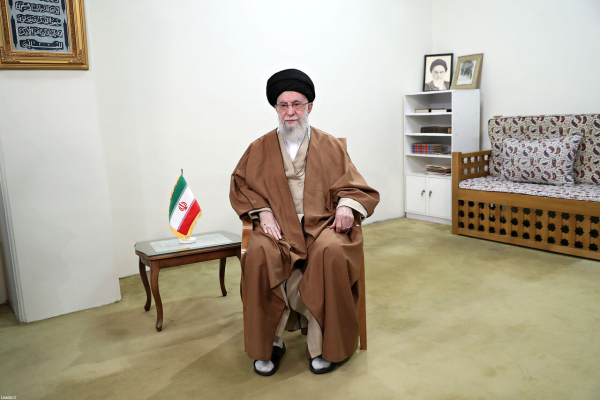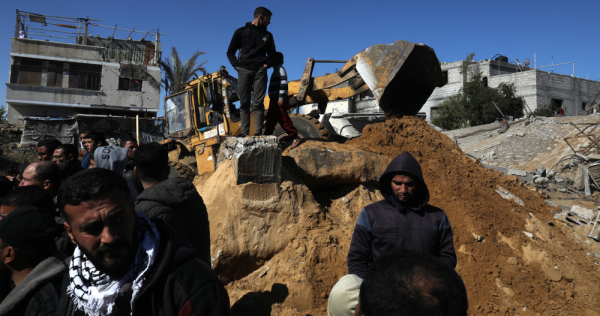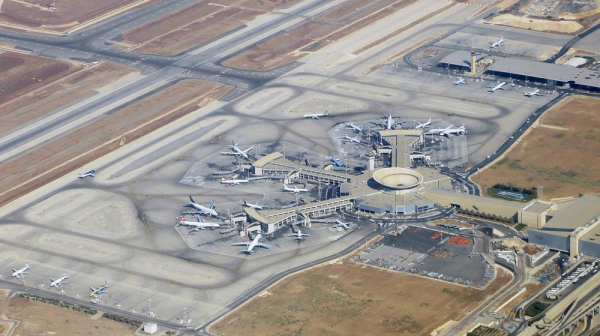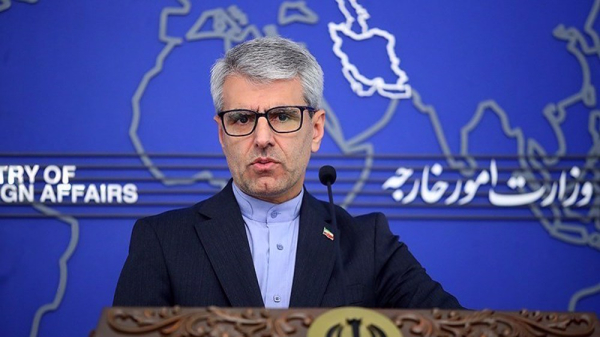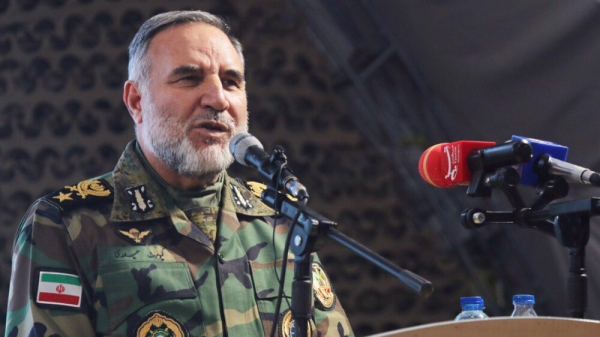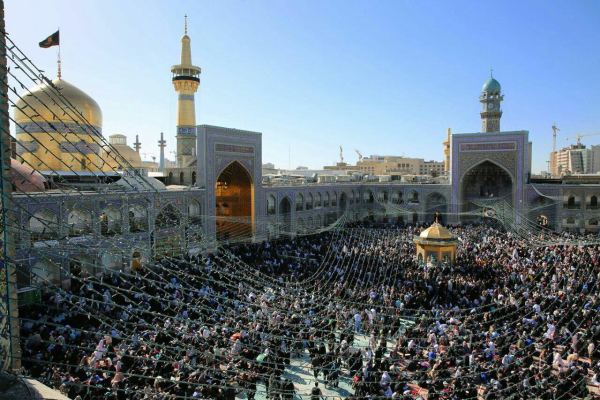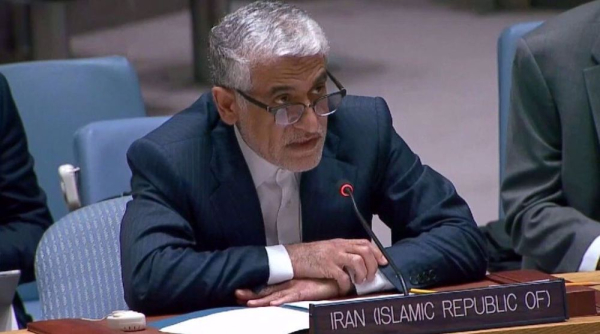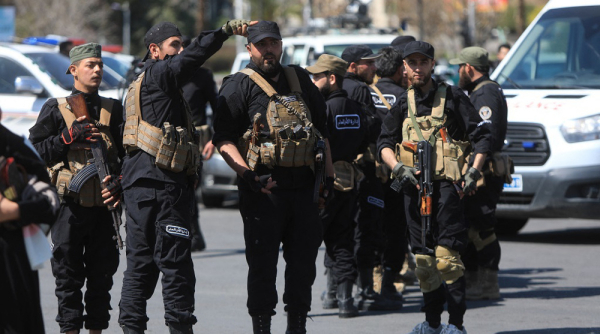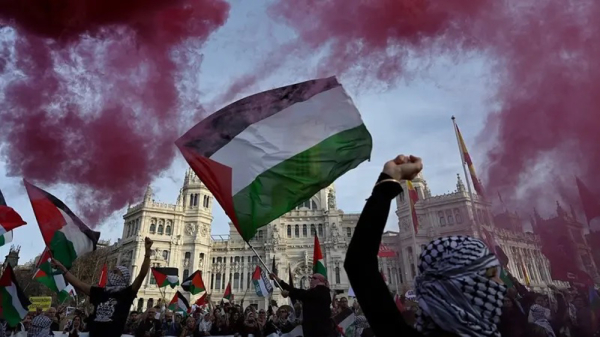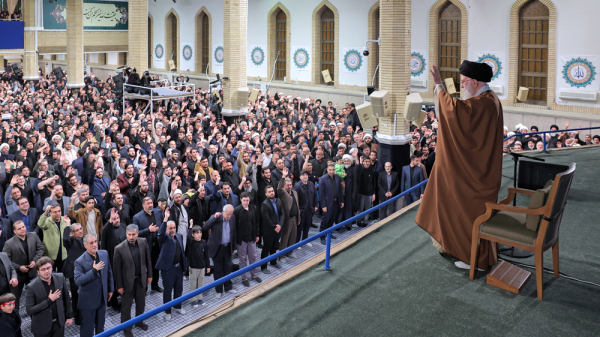zarezadeh
How Leader outlined Iran’s priorities for new year in Nowruz speech
By Alireza Akbari
On Friday morning, Leader of the Islamic Revolution Ayatollah Seyyed Ali Khamenei addressed a gathering of people and government officials at an event, marking the beginning of the new Iranian calendar year.
In his New Year speech, which began at 10 AM, Ayatollah Khamenei covered a range of topics, including key events from the past year, this year's slogan, recent political developments, and regional issues concerning the Axis of Resistance.
He offered invaluable guidance to the Iranian people, government officials and institutions, highlighting issues related to both domestic affairs and foreign policy of the country.
Leader congratulated the nation on the new year, 1404, noting that this year's Nowruz celebrations hold heightened spiritual significance due to their concurrence with the holy month of Ramadan and the martyrdom anniversary of Imam Ali (AS).
He emphasized that Iranians regard Nowruz as a deeply spiritual occasion, which begins each year with solemn prayers.
Ayatollah Khamenei said despite hostile enemy propaganda aimed at distancing Iranians from spirituality, such efforts have failed. Instead, there has been a growing inclination among Iranians toward spirituality and a deepening devotion to the Ahl al-Bayt, the holy progeny of Prophet Mohammad (PBUH).
Leader of the Islamic Revolution described Imam Ali (AS) as the pinnacle of justice, piety, and forgiveness, urging Muslim nations to draw lessons from his life by studying Nahj al-Balagha, the collection of sayings and sermons of the first Shiite Imam.
He specifically called on the country's cultural officials and institutions to give special attention to this significant text.
Discussing the power of prayer, Leader of the Islamic Revolution emphasized that young people, through prayer, have the ability not only to shape their own destinies but also to influence the fate of an entire nation.
He affirmed that prayers are heard and answered, calling prayer a pathway to success in this life and the life hereafter.
Referring to Prophet Moses' confrontation with Pharaoh, Ayatollah Khamenei recounted that God instructed Moses to stand firm, ultimately leading to the triumph of truth despite the seemingly impossible battle between blood and swords.
He drew a parallel to contemporary struggles between truth and falsehood, stressing that while truth ultimately prevails, victory comes at the cost of sacrifice.
He referenced the eight-year Sacred Defense, acknowledging the global recognition of Iran’s victory while also highlighting the heavy price paid in the form of martyrdom.
In the second part of his speech, Leader praised the Iranian nation's patience, resilience, courage, and bravery in the face of the past year’s challenges.
He also pointed to the remarkable public turnout during the funeral procession of the late President Ebrahim Raeisi, who was martyred in a plane crash in April, underscoring the nation’s unity and strength.
Ayatollah Khamenei described the congregational Friday prayers of October 4, 2024, as a historic event, emphasizing that despite threats from adversaries attempting to intimidate the public, the Iranian people turned out in large numbers to participate.
This Friday prayer, led by Leader of the Islamic Revolution himself, saw enthusiastic public attendance. It took place amid aggression by the occupying regime against Gaza, Lebanon, and Yemen, following the assassination of Hezbollah leader Sayyed Hassan Nasrallah and several other Hezbollah leaders and commanders.
He also commended the relevant authorities for holding presidential elections on time within 50 days as well as the formation of a new government as a testament to the people's active presence.
President Ebrahim Raeisi and Foreign Minister Hossein Amir-Abdollahian were martyred in a helicopter crash in northwestern Iran on May 20, 2024, which was followed by massive funeral processions attended by millions in Tehran, Tabriz, and Mashhad.
Subsequently, the 14th presidential election was held on July 5, 2024, resulting in Masoud Pezeshkian being elected as the new president, succeeding Martyr Raeisi.
Ayatollah Khamenei further pointed to the overwhelming public participation in the February 10 rallies marking the 46th anniversary of the Islamic Revolution as another powerful demonstration of the Iranian nation's presence on the national stage.
During these rallies, people across Iran carried flags of the Islamic Republic and the Palestinian and Lebanese resistance groups, expressing unified support for the Islamic Republic while chanting slogans against the US and the Israeli regime.
Ayatollah Khamenei pointed out that despite economic hardships, the people's strong presence reflected their continued commitment and support for the Islamic Republic, significantly influencing enemy perceptions.
Leader also highlighted the Iranian people's active role in the development, reconstruction, and progress of the country, noting their dynamism and enthusiasm in these fields.
Referring to recent years’ slogans, such as Production Leap, and the importance of public participation in production activities, he stressed the critical role of domestic production in improving people's livelihoods.
He emphasized that production requires investment, not foreign investment, but rather the proper utilization of the liquidity currently in the hands of the people.
“This liquidity can be directed toward the country’s progress and boosting production,” the Leader stated in his annual address.
He added that people, officials, and entrepreneurs all must contribute to production, even on a small scale, in line with their capabilities.
Discussing the government's role in achieving this year’s objectives, the Leader stated, “The government’s responsibility is to create suitable conditions and plan effectively to achieve this goal.”
Addressing regulatory institutions of the country, he stressed that investment security is crucial, urging authorities to maintain stable laws and regulations to ensure investor confidence.
Leader of the Islamic Revolution further identified streamlining investment procedures as another critical responsibility of officials, emphasizing the need to “reduce intermediaries.”
He also warned that simultaneously importing goods already produced domestically harms local industries.
Calling on government bodies to clearly outline employment opportunities to the public, he reiterated that strengthening domestic production remains one of the most fundamental solutions to improving people's livelihoods.
In the concluding part of his speech, addressing American politicians, Ayatollah Khamenei warned that the US would achieve nothing through threats against Iran.
"If they commit any malicious act against Iran, they will receive a hard slap," he stated.
He also criticized American policymakers for their miscalculations in the region, rejecting the notion that resistance movements operate as proxies of the Islamic Republic.
"The Islamic Republic does not need proxies," he stressed, adding that it was the motivation of the Yemeni people themselves that led them to stand against the hostility and malicious actions of the Zionist regime.
Ayatollah Khamenei pointed to widespread protests against the Zionist regime, stating, “This regime has caused deep suffering for many nations, yet Western officials refuse to acknowledge these demonstrations.”
He also referenced the growing Pro-Palestine advocacy in American universities, criticizing the Trump administration's threat to cut funding.
Trump administration threatened to withhold federal funding from universities, including Columbia University, in response to pro-Palestinian protests on campus.
Ayatollah Khamenei concluded by reaffirming the Islamic Republic’s support for Palestinian and Lebanese resistance fighters, stating that Iran has never been the initiator of conflict but is ready for any eventuality.
He warned that “if any malicious actions are taken against the Islamic Republic, they will receive a hard slap.”
Press TV’s website
Hamas condemns US-Israel aggression against Yemen, Lebanon, Syria
The Islamic Resistance Movement Hamas has strongly condemned the brutal US aggression against Yemen, and Israel's aggression against Lebanon, and Syria.
In a statement on Sunday, Hamas called the aggression a blatant violation of national sovereignty and international laws.
These aggressions are “an extension of the ongoing aggression against our Palestinian people in Gaza and the West Bank,” Hamas said.
Hamas has emphasized that the escalation of US attacks against Yemen, and Israel against Lebanon and Syria parallels the daily massacre of Palestinians in Gaza and the occupied West Bank.
According to Hamas, these acts of aggression need a “unified Arab and Islamic stance that rises to the level of this attack and puts an end to the enemy’s arrogance and ongoing criminality.”
The US military on Saturday night attacked the airport in Hudaydah in the latest "American aggression" against Yemen since Washington announced heavy strikes on the impoverished country one week ago.
Yemen's al-Masirah TV said three airstrikes targeted the airport on the Red Sea coast. Yemeni media outlets also reported US airstrikes on the port of Salif in Hudaydah province.
American warplanes further carried out five strikes on the Majzar district in Yemen's central province of Ma’rib.
On March 15, the United States announced a wave of airstrikes that Yemeni officials said killed 53 people.
The strikes, the first since President Donald Trump resumed office, came after Yemeni forces pledged to renew operations against Israeli shipping in solidarity with the Palestinians.
In a further escalation, the United States recently announced plans to deploy a second aircraft carrier, the USS Carl Vinson, to the region.
Meanwhile, Israel carried out airstrikes in Lebanon and Syria.
Lebanese Foreign Minister Youssef Rajji on Sunday contacted several Arab and other foreign officials and urged international pressure on the occupying Tel Aviv regime after at least seven people were killed and 40 injured in Israeli airstrikes across Lebanon.
Press TV’s website
Yemeni forces hit Israel's Ben Gurion airport again with hypersonic ballistic missile
Yemeni Armed Forces have launched another missile attack at the occupying Israeli regime, backing the brave Palestinian resistance against the oppressing regime forces.
The Yemeni forces announced on Sunday that they again targeted Israel's Ben Gurion airport in Tel Aviv with their hypersonic Palestine 2 ballistic missile.
They said the strike successfully achieved its "goal" to disrupt air traffic in the occupied Israeli territories as long as the zionist killing machine continued its genocidal war against the Gaza Strip.
The Israeli forces confirmed that a missile had set off air raid sirens at around 7:30 a.m. in several areas across the occupied territories, but claimed to have intercepted it.
Reports said following the missile attack, chaos broke out at Ben Gurion Airport with air raid sirens blaring and flight operations all messed up.
Flights at the airport were temporarily stopped and the passengers were evacuated into shelters.
In addition, the Yemenis said they also successfully launched their missiles and drones at the American aircraft carrier USS Harry Truman stationed in the Red Sea.
"And in response to the American aggression that launched dozens of airstrikes on our country in the past hours, our forces clashed—through the missile force and the drone air force—the American aircraft carrier USS Harry Truman and a number of enemy warships in the Red Sea, using multiple missiles and drones. The confrontations lasted for several hours," Yemeni Armed Forces announced.
"By relying on Allah, the Yemeni Armed Forces continue to confront this brutal and criminal aggression and are meeting escalation with escalation with full courage," they said.
"They also remain steadfast in supporting the oppressed Palestinian people and preventing 'Israeli' navigation in the previously declared operation zone until the aggression stops and the siege on Gaza is lifted," it added.
Early on Saturday, Yemen's military "targeted Ben Gurion airport" with a ballistic missile, calling it the third launch in two days. Israeli airspace will remain unsafe "until the aggression against Gaza stops", Yemeni Armed Forces announced in an earlier statement.
After Washington announced heavy strikes against the Yemeni nation a week ago, US military forces attacked the airport in Hudaydah in its latest aggression against the Yemenis.
Americans launched three airstrikes against the airport on the Red Sea coast Saturday night, Yemen's al-Masirah TV reported. Yemeni media outlets also reported US airstrikes on the port of Salif in Hudaydah province.
Five more airstrikes were carried out by US warplanes on the Majzar district in Yemen's central province of Ma’rib.
On Wednesday, the US military's Central Command confirmed “continuous operations” against Yemen.
On March 15, the United States announced a wave of airstrikes that left 53 Yemenis killed.
The deadly strikes, the first since US President Donald Trump resumed office, came after Yemeni forces pledged to renew operations against Israeli shipping in solidarity with the Palestinian suffering from Israeli attacks.
In a further escalation, the United States recently announced plans to deploy a second aircraft carrier, the USS Carl Vinson, to the region.
Yemen's Ansarullah leader Abdul-Malik al-Houthi said on Saturday that while the US typically uses its aircraft carriers to project its military might to the world to intimidate other countries, the vessels have transformed into “a burden and a danger” for the politicians in Washington.
The Yemeni Armed Forces started their military operations against the Israeli regime in late 2023 shortly after Tel Aviv launched its genocidal war against the Palestinians trapped in Gaza.
The Yeminis stopped targeting ships in the Red Sea in January after a ceasefire was announced between Israel and Hamas, but the operations resumed last week after Israel cut off the flow of humanitarian aid to Gaza earlier this month and broke the ceasefire deal brokered by Trump.
More than 50,000 Palestinians have been killed in Gaza since Tel Aviv launched its genocidal war in Gaza.
Press TV’s website
Iran slams terror attack on mosque in southwestern Niger
Iranian Foreign Ministry spokesman Esmaeil Baghaei has strongly condemned a terrorist attack on a mosque in southwestern Niger.
At least 44 people were killed and 13 injured in the assault in the village of Fonbita in the rural commune of Kokorou that happened when militants identified as members of the Islamic State in the Greater Sahara (ISGS) stormed the mosque, targeting worshippers on Friday.
The victims were killed in a “savage” armed assault, the interior ministry said in a statement broadcast on state television on Friday.
Baghaei said on Saturday that the terrorist act, which was carried out in a holy place and during the Friday prayers, was against the principles of Islam and contrary to all international legal and human rights norms.
The Iranian spokesperson affirmed the Islamic Republic’s principled stance on condemnation of all forms of terrorism and violent extremism.
He stressed the importance of further improving cooperation and coordination at various regional and international levels to prevent and combat terrorism.
It is necessary to prosecute and punish the perpetrators and instigators of terrorist attacks, he said.
Baghaei expressed sympathy with the families of the victims and the government and the nation of Niger over the terrorist attack.
Press TV’s website
Iranian Army will crush enemies if they make any mistake: Commander
Iran’s Army Ground Force Commander Brigadier General Kiumars Heidari
Iran’s Army Ground Force Commander Brigadier General Kiumars Heidari says his force is vigilant and fully ready to crush enemies in case they make any misadventure.
"Iran’s Army Ground Force is always awake, alert and ready to crush the shameful lives of the enemies in case of any mistakes,” Heidari said on Saturday.
It is imperative for Iranian military units to constantly promote their combat readiness and deterrent power to improve the Islamic Republic’s sustainable security, he added.
The top commander noted that the Ground Forces are trying to keep their full vigilance and rely on state-of-the-art defense and security achievements to maintain border security.
US President Donald Trump has ratcheted up war rhetoric against Iran as he claimed that Tehran can be dealt with either through military means or by reaching a deal over its nuclear program.
On Monday, Trump also signaled a significant escalation, threatening Iran over any operations carried out by Yemen against Israel.
However, Leader of the Islamic Revolution Ayatollah Seyyed Ali Khamenei said Friday that US threats against Iran "will get them nowhere."
The Leader added that Americans "and others should know that if they do anything malign to the Iranian nation, they will get a hard slap."
Press TV’s website
Nowruz, Ramadan inspire community unity in Iran
As Iranians come together at Imam Reza’s holy shrine in the northeastern city of Mashhad to celebrate Nowruz, the Persian New Year, they also embrace the deep spiritual significance of the sacred nights of “Laylat al-Qadr” in the holy month of Ramadan. This unique convergence of culture and faith highlights a profound journey of renewal and hope.
Press TV’s website
Iran's mission blasts US complicity in 'egregious' Israeli crimes
Iran's ambassador to the UN has rejected US and Israeli accusations of destabilizing activities against Tehran, saying they aim to shield Israel and "perpetuate impunity for its crimes".
The accusations are “entirely groundless, devoid of any credibility, and serve as nothing more than a calculated attempt to distract the international community from the unfolding Israeli genocidal war, war crimes, and mass atrocities against the Palestinian people in Gaza,” Amir Saeid Iravani said.
“They also aim to obscure the United States' undeniable complicity in these crimes and its steadfast support for Israel’s destabilizing and malign activities across the region," he added.
Iravani's response on Friday came in identical letters addressed to UN chief António Guterres and the rotating president of the Security Council Christina Markus Lassen after the US and Israel accused Iran of destabilizing activities and supporting terrorism.
Iravani said Washington's "unwavering political, military, and financial support has emboldened Israel to commit egregious crimes with absolute impunity".
"The baseless allegations against the Islamic Republic of Iran are, therefore, nothing but a desperate attempt to obstruct the Security Council from shouldering its responsibility, deflect attention from the truth, shield Israel from accountability, and perpetuate impunity for its crimes.”
The accusations, he said, once again highlight the hostile policy of the US administration towards the Islamic Republic, and affirm that Washington disregards the realities on the ground and continues to make false accusations against Tehran.
Iravani hit out at the US for manipulating the Security Council to advance its "political agenda and falsely depicting Iran as a threat to international peace and security” through its nuclear program.
“I must emphasize that Iran’s nuclear activities are entirely peaceful and fully compliant with its obligations under the Non-Proliferation Treaty. In stark contrast, the United States remains the only country to have ever used nuclear weapons, committing war crimes and crimes against humanity,” he said.
Iravani then lambasted Washington’s evident double standards and hypocrisy in its continued silence on Israel’s undeclared nuclear arsenal and its failure to address Israel’s repeated threats to use weapons of mass destruction against the Palestinian people in Gaza.
Such an approach, he said, exposes how the non-proliferation issue serves merely as a political tool for the United States.
Press TV’s website
Reoirt: Syrian regime's militants kill 72 people in one day
The Hay’at Tahrir al-Sham-led (HTS) militants of the ruling regime in Syria have killed 72 people across the conflict-ridden country in the past 24 hours, a UK-based war monitor says.
The so-called Syrian Observatory for Human Rights (SOHR) said that 58 out of 72 were killed by “armed groups" affiliated with the HTS-aligned General Security and military factions in the provinces of Tartus and Latakia.
The remaining murders took place in the Aleppo, Dara'a, Dayr al-Zawr, Damascus, and Homs provinces, it added.
On December 8, 2024, foreign-backed HTS militants announced the fall of the government of President Bashar al-Assad following a rapid two-week onslaught.
Earlier this month, the HTS militants and armed opposition groups engaged in gruesome massacres in the country’s northwestern coastal region.
SOHR said this week that more than 4,711 civilians, including 345 women and 194 children, were massacred in the 100 days since the ouster of the Assad government.
Spanish protest and undercurrent of intl. call for boycott Israel
Thousands gathered in central Madrid to protest the genocide in Gaza following bombings that killed hundreds and ended the ceasefire.
Organized by the BDS and RESCOP, the demonstration condemned complicity of the West in the Gaza genocide since October 7, 2023.
The protesters demanded an end to the aggression and stronger international intervention.
We urge the international community to enforce a cease fire and sanction Israel for violating the humanitarian law in Gaza, diplomatic and trade ties must not continue with a regime that disregards international law.
Fernando Ruiz, BDS Activist
Protesters condemned the Israeli regime for not abiding by the ceasefire agreement and refusing to finalize phase two of the deal.
Israel is showing that it never had any intention of honoring the ceasefire agreed upon with international guarantors. It has all been a facade allowing Israeli forces to reorganize and rethink their alliance with the most radical elements of the government.
Felix Nunez, Activist and former Human Shield in Iraq War
The latest attacks follow Washington's green light for Israel's actions after consultations between the Zionist entity and the United States.
The UN, China, the UK and other countries, have called for an end to the bombings and a return to the ceasefire, but have failed to take any practical action to end the bloodshed.
My presence here today is an act of humanity. We cannot remain indifferent to this tragedy. I have a special friend in Gaza, and I don't know if she and her family are still alive. We must stop this genocide and keep taking to the streets.
Cristina Robles, Activist for Palestine
Experts suggest that Israel's shift in its aggressive campaign is driven by the need for political support within its fragile coalition.
By catering to far-right factions, the cabinet meets its extreme demands to avoid a collapse.
This strategy prioritizes political survival over peace efforts, worsening the conflict.
Demonstrators in Madrid, like other cities across Spain, have flooded the streets demanding an end to Israel's relentless assault on Gaza as it's taking a heavy toll on civilians.
The protesters cry out for urgent international action but will the world act before it's too late?
Press TV’s website
Leader warns US against using language of threats against Iran
Leader of the Islamic Revolution Ayatollah Seyyed Ali Khamenei has warned the United States against using the language of threats against Iran.
In his New Persian Year speech on Friday, Ayatollah Khamenei said that the adversaries will receive a hard slap in the face if they carry out any vicious act against Iran.
The Americans should know that in dealing with Iran, they can never get anywhere using threats, he said.
They and others should know that if they take any vicious act against the Iranian nation, they will receive a hard slap in the face, the Leader added.
Ayatollah Khamenei said the Iranian nation is standing up to such viciousness and bullying against the country’s enemies and clearly declared its position in support of the Palestinian and Lebanese fighters who are defending their countries.
The Leader also dismissed the Western portrayal of the resistance front as a network of Iranian proxies, saying the country has no proxy force but supports the resistance fighters in the region.
He said the US and European officials make a big mistake when they call resistance groups in the region Iranian proxies; they insult them.
Ayatollah Khamenei said the Yemenis are "standing up and resisting (the oppressors). It is a big mistake to think they are doing this on behalf of Iran. No, it is not on behalf of Iran."
"The Yemeni people are motivated, the resistance centers in the regional countries are motivated. Iran does not need proxies. What does proxy mean?" the Leader asked.
Elsewhere in his remarks, the Leader said the resistance front incurred costs in confrontation with oppressing powers over the past Persian calendar year, but nobody should have any doubt that it will be ultimately victorious.
Referring to growing anti-Israel protests by non-Muslim nations, Ayatollah Khamenei said that Western leaders do not want to see the realities and instead cut funding to the universities whose students held demonstrations in support of Palestine.
"The nations and centers of the resistance front, including the Palestinian nation, Lebanon, and Yemen, are standing against the corrupt and wicked Zionist regime with internal and faith-based motivations," he stated.
Press TV’s website
